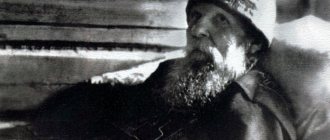Iconography: Seraphim of Sarov, reverend. Dating: XX century. Beginning of the 20th century. Origin: village of Alexandrovo, Likhoslavl district. Material: wood, oil. Frame material: glass. Dimensions of the icon: height 28.7 cm, width 24.5 cm. Half-length image of St. Seraphim of Sarov
“My joy, acquire a peaceful spirit, and thousands around you will be saved,”
- this is, apparently, the most famous teaching of the Monk Seraphim, which he himself followed. That is why his words are so valuable to so many now.
Brief Life
Main article: “The Life of Father Seraphim, the Wonderworker of Sarov.”
About the icons of St. Seraphim of Sarov.
A brief prayer rule of Seraphim of Sarov for the laity.
Healing springs of Seraphim of Sarov.
Prokhor Moshnin (the worldly name of the saint) is a native of Kursk. The year of his birth is considered to be 1754. Prokhor's father is the pious merchant Isidore, his mother is Agathia. Prokhor was special from childhood: meek, prayerful. The stamp of God's election to the monastic path lay on him from an early age. It is known that as a boy he fell from the bell tower of a temple under construction, but remained completely unharmed. This made a huge impression on his mother. Apparently, then she thought about her son’s special path - perhaps a monastic one. This conviction was especially strengthened after the miracle with the Kursk root icon. During the religious procession with her, young Prokhor, who was seriously ill, received healing.
In 1778, Prokhor came to the Sarov Monastery, where he was a novice for a long time, and in 1786 he took monastic vows with the name by which he would be known throughout Russia - Seraphim. He was soon ordained a hierodeacon, and in 1793 he became a hieromonk. Seraphim's monastic life is marked by the seal of God's election in the same way as his worldly life.
Useful materials
While still a novice, he fell seriously ill with dropsy, and was instantly healed by the Mother of God who came to him. In total, there were 12 appearances of the Most Pure Mother of God to the “poor Seraphim,” as he called himself.
From Seraphim’s deaconal service it is known how once during the liturgy he saw Christ Himself. The truth of the vision was certified by his spiritual father, the experienced elder Joseph. However, he commanded the young hierodeacon to protect himself with silence in order to avoid exaltation.
But miracle follows miracle in the life of this amazing monk. From 1794 he went into solitary asceticism. Outside the monastery walls he built a hermitage, planted a vegetable garden and an apiary. They said that wild animals came to the monk, even a bear that fed from his hands. His exploits were then known only to God. From what people know, we can talk about the feat of stylites - standing on a stone for 1000 days, about the three-year feat of silence undertaken by Fr. Seraphim since 1807. Since 1810, Seraphim returned to live in the monastery, but lived as a recluse for 15 years.
Iconography: Prayer of Seraphim of Sarov on a stone. Dating: XIX century. Icon painting school or art center: Russia. Material: wood, gesso, oil. Dimensions of the icon: height 17.5 cm, width 14.5 cm. St. Seraphim of Sarov is depicted in the thick of the forest, praying while kneeling on a stone. © Omsk Regional Museum of Fine Arts named after M.A. Vrubel
Since 1825 Fr. Seraphim went out to serve the elderly and began to receive people. This obedience of his continued until 1833.
Already during his lifetime, many revered Seraphim as a saint. His first biographies began to appear a few years after his death. Evidence of miracles also multiplied.
2
January
1833
The elder's earthly journey is over. The day before, the saint took communion at the liturgy, said goodbye to the brethren, and said:
“Save yourself, do not lose heart, stay awake, today crowns are being prepared for us.”
In 1903, St. Seraphim was glorified as a saint.
Condemnation, hostility, forgiveness
Why do we condemn our brothers? Because we do not try to know ourselves. He who is busy knowing himself has no time to notice others. Condemn yourself and you will stop judging others.
Condemn a bad deed, but do not condemn the doer himself.
One should not judge anyone, even if one has seen with one’s own eyes someone sinning or obsessing over the transgression of God’s commandments, according to the word of God: Judge ye, that ye be not judged (Matthew 7 :1), and again: who art thou, a judge of a strange servant? his Lord stands or falls; It will become, for God is strong to establish it (Rom. 14:4).
It is much better to always bring to mind these Apostolic words: be determined to stand and be careful, lest you fall (1 Cor. 10:12). For it is unknown how long we can remain in virtue, as the prophet says, having learned this by experience: I have died in my abundance: I will not move forever. Thou didst turn away Thy face, and was embarrassed (Ps. 29:7-8).
To get rid of condemnation, you must pay attention to yourself, not accept extraneous thoughts from anyone, and be dead to everything.
God commanded us to enmity only against the serpent, that is, against the one who initially deceived man and drove him out of paradise - against the murderer-devil. We are commanded to be hostile also against the Midianites, that is, against the unclean spirits of fornication and adultery, who sow unclean and nasty thoughts in the heart.
One must try by all means to maintain peace of mind and not be indignant at insults from others; For this purpose, one must try in every possible way to restrain anger and, through attention, keep the mind and heart from indecent movements. And therefore we must endure insults from others with indifference and learn to accept such an attitude, no matter how much their insults concern us. Such an exercise can bring silence to the human heart and make it an abode for God Himself.
We must endure insults from others with indifference and become accustomed to such a state of mind, as if their insults concern others rather than us.
If it is impossible not to be indignant, then at least we must try to hold our tongue, according to the Psalmist: Confused and speechless (Ps. 76:5).
And how to overcome anger, this can be seen from the life of Paisius the Great, who asked the Lord Jesus Christ, who appeared to him, so that He would free him from anger. And the Savior said to him: “If you want to overcome anger and rage, covet nothing, hate anyone, or disdain him.”
The history of the publication of the elder's teachings
Instructions about. Seraphim has been preserved mainly from the last period of his life, when he had already established himself as an ascetic and confessor.
At the same time, Fr. Seraphim did not specifically write any essays. His instructions were recorded by spiritual children and are known from the recollections of people who personally knew the elder.
The elder’s teachings were first published in a small book in 1839. The work of collecting sayings and spiritual advice from Fr. Seraphim took over as priest. Sergius (Vasiliev), tonsured at the Sarov monastery. At first he was going to publish the elder’s teachings along with his life story, but the life story was not passed by the censorship committee. As a result, the instructions were published as an appendix to the biography of another Sarov ascetic, Mark. Later instructions from St. Seraphim began to be published as part of his life.
Silence
To maintain attention, you need to withdraw into yourself, according to the Lord’s verb: Kiss no one on the way (Luke 10 :4), that is, do not speak without the need, unless someone runs after you to hear something useful from you.
Nothing contributes more to the acquisition of inner peace than silence and, as much as possible, constant conversation with oneself and rare conversations with others.
When we remain in silence, then the enemy, the devil, will not have time to reach the hidden person of the heart; This must be understood about silence in the mind.
From solitude and silence tenderness and meekness are born; the action of this latter in the human heart can be likened to that quiet water of Siloam, which flows without noise or sound, as the prophet Isaiah says about it: The waters of Siloam are flowing yew (Is. 8:6).
He who has come to silence must constantly remember why he came, so that his heart does not deviate to something else.
Staying in the cell in silence, in the exercise of prayer and teaching day and night the law of God makes a person pious, for, according to the holy fathers, the monk’s cell is the cave of Babylon, in which the three children found the Son of God (Philokalia. Part 3. Schmch. Peter of Damascus).
Famous sayings and advice relevant to the laity
The elder’s advice not only to the laity, but even to ascetic monks is simple and filled with love for people and sympathy for infirmities. The wise old man did not want to place an unbearable burden on a person, pitying and having mercy on everyone. It is no coincidence that he addressed anyone who came: “My joy!”
About prayer
The monk called prayer “the path to the Lord.” Moreover, this instrument of our salvation is always with us, for “there is always an opportunity for prayer for everyone: the rich and the poor, the noble and the simple, the strong and the weak, the healthy and the sick, the righteous and the sinner.” Indeed, everyone can pray in any condition.
Particularly important is the Jesus Prayer, “Lord Jesus Christ, Son of God, have mercy on me, a sinner,” which brings grace to the soul.
About the prayer rule
St. Seraphim considered three prayers to be the “foundation of Christianity”:
- The Lord's Prayer (“Our Father”), it was given by the Lord
- “Virgin Mother of God, rejoice...” - Angelic greeting to the Mother of God
- Creed - dogmas
“Having risen from sleep, every Christian, standing before the holy icons, let him read the Lord’s Prayer: “Our Father” - three times, in honor of the Most Holy Trinity; then the hymn to the Mother of God: “Virgin Mother of God, rejoice...” - also three times, and finally the Symbol of Faith - once. Having completed this rule, let every Christian go about his business to which he has been assigned or called.”
The same rule is read in the evening..
This rule was intended for laymen and monastics who did not know how to read and write and were extremely busy with work and obedience. It must be combined with the unceasing Jesus Prayer, performed throughout the day, or at least “Lord, have mercy,” and short prayers to the Mother of God. That is, the rule of St. Seraphim involves virtually unceasing prayer work.
About the church
The monk said that one should always enter the temple of God “with fear and trembling, and never with unceasing prayer.” In order not to become distracted, the priest advised from time to time to pray with closed eyes, as he often did himself.
About human life
“Looking at a burning candle, especially when we stand in God’s temple, let us remember the beginning, course and end of our life, for just as a candle lit before the face of God melts, so our life diminishes with every minute, bringing us closer to the end. This thought will help us have less fun in church, pray more diligently and try to make our life before God look like a candle made of pure wax that does not emit a stench.”
Conversation with Motovilov about the meaning of life
Nikolai Motovilov is a Simbirsk landowner. When he was 22 years old, he fell ill with rheumatism. St. Petersburg healed him from this illness. Seraphim. It is believed that this healing was one of the first performed by the monk after leaving seclusion for senile service. Nikolai became the spiritual son of the elder. Many of his teachings have come down to us precisely in Motovilov’s retelling.
Nikolai Motovilov and etc. Seraphim
Various points of view are expressed regarding the personality of Motovilov, and, accordingly, the correctness of his transmission of the content of conversations with the monk and the truth of the content of the surviving texts. The “Notes of Motovilov” published in 2005 caused different assessments among church historians. For example, V. Stepashkin in the latest (2018) study about St. Seraphim questions the spiritual level and even mental health of Motovilov.
Some historians draw attention to the ambiguity of Motovilov’s role in the life of the Diveyevo community after St. Seraphim (for example, N.V. Bukova in her book about the Diveyevo community (2010) talks about his purchase of surrounding lands for next to nothing and economic pressure on the community).
The manuscript of the conversation was found in the papers of N.A. Motovilov’s wife, Elena Ivanovna, after her death in 1903. According to the manuscript, the conversation took place 2 years before the elder’s death, in November 1831, shortly after Nikolai’s healing from illness. Despite all the ambiguity of the attitude towards N.A. Motovilov, most authors do not question the historicity of the conversation of St. Seraphim and its contents.
Acquiring the grace of the Holy Spirit as the goal of a Christian’s life
In contrast to the position widespread among contemporaries about fulfilling the commandments as the most important work, St. Seraphim sees in them only a means to achieve the main goal of Christian life - the acquisition of the Holy Spirit, Communion with God. The conversation immediately became extremely relevant in the church environment of those years, when piety increasingly came down to the observance of rituals and rules.
St. Seraphim says:
“Prayer, fasting, vigil and all sorts of other Christian deeds, no matter how good they are in themselves, however, doing them alone is not the goal of our Christian life, although they serve as necessary means for achieving it. The true goal of our Christian life is to acquire the Holy Spirit of God. Fasting, and vigil, and prayer, and almsgiving, and every good deed done for the sake of Christ are means for acquiring the Holy Spirit of God. Please note, father, that only for the sake of Christ does a good deed bring us the fruits of the Holy Spirit. Still, what we do not for the sake of Christ, even though it is good, does not represent a reward for us in the life of the next century, and it does not give us the grace of God in this life either.”
What is grace?
“When the Spirit of God descends upon a person and overshadows him completely with His influx, then the human soul is filled with indescribable joy, for the Spirit of God brings joy to everything that He touches. This is the same joy about which the Lord speaks in His Gospel: when a woman gives birth, she has sorrow, because her year has come; but when a child gives birth, she does not remember sorrow for the joy that a man is born into the world. There will be sorrow in the world, but when I see you, your heart will rejoice, and no one will take your joy from you. But no matter how comforting this joy that you now feel in your heart may be, it is still insignificant in comparison with that about which the Lord Himself through the mouth of His Apostle said that the joy of that joy is neither seen nor heard, nor heard. The good things that God has prepared for those who love Him have not risen in the heart of man.”
The conversation also contains a unique description of the experience of being in grace by the elder and his disciple, similar to the experience of the ancient ascetics. Motovilov describes the saint’s response to a request to show tangibly what it means to be in the Holy Spirit:
“Then Father Seraphim took me very tightly by the shoulders and said to me: “We are both now, father, in the Spirit of God with you!.. Why don’t you look at me? I answered: “I can’t look, father, because lightning is pouring from your eyes.” Your face has become brighter than the sun, and my eyes are aching with pain!.. Father Seraphim said: “Do not be afraid, your love of God!” And now you yourself have become as bright as me. You yourself are now in the fullness of the Spirit of God, otherwise you would not be able to see me like this. And bowing his head to me, he quietly said to me in my ear: “Thank the Lord God for His unspeakable mercy to you.” You saw that I only mentally said to the Lord God in my heart and within myself: Lord! Make him worthy to see with his bodily eyes the descent of Your Spirit, with which You honor Your servants when You deign to appear in the light of Your magnificent glory! And so, father, the Lord instantly fulfilled the humble request of the poor Seraphim...”
Iconography: Seraphim of Sarov, reverend. Dating: XX century. After 1902. Material: wood, fabric, metal, lithography. Dimensions of the icon: height 22.3 cm, width 17.7 cm. Half-length image of St. Seraphim of Sarov
About God and the kingdom of God within us
The monk in his preaching of the love of God is like the Apostle John the Theologian.
St. Seraphim never tired of emphasizing the goodness and mercy of the Creator towards fallen man:
“God shows us His love for mankind... not only when we do good, but also when we insult and anger Him. How patiently He bears our iniquities! And when he punishes, how compassionately he punishes!” Therefore, “do not call God Just; for in your works His justice is not visible... and His Son showed us that He is more good and merciful. Where is His justice?
How can we know the Lord? It's a secret:
“You cannot love God unless you see Him. The vision of God comes from knowing Him.”
And the Kingdom of God is not outside of man, neither high nor far away. According to the saint, the Kingdom of God is contained within a person, “Heaven or hell begins on earth”
About the creation of man
During the time of St. Seraphim, the works of Charles Darwin appear in the West for the first time, and religion’s vision of the origin of man is called into question. Apparently, educated visitors to Sarov asked similar questions to St. Seraphim. Statements have been preserved interpreting the creation of man according to the Bible. He explains what it means to create man “from the dust of the ground.” In his opinion, Adam was created “as an active animal being, like other animate creatures of God living on earth.” But the difference between a person is the grace of the Spirit given to him from God, which makes a person a person different from other creatures
“Though having flesh and soul and spirit, which belongs to each according to their kind, yet not having the Holy Spirit within them.”
About the post
The monk always emphasized the spiritual meaning of fasting. Therefore, despite the importance of abstinence, it is more important not to be tempted by food at all, for example, there is no need to “discriminate between tasty and tasteless foods.” You should remember the purpose of fasting - spiritual success. St. Seraphim emphasizes that the Lord Jesus Christ fasted before His preaching, giving us an example of how to strengthen ourselves before beginning spiritual work. However, fasting is a means, not an end.
As for the severity of bodily abstinence, the monk advised to begin fasting gradually. As an example, the saint cited Abba Dorotheus, who gradually taught his disciple Dositheos to abstinence. In addition, fasting, according to the monk, does not consist of eating rarely or abstaining altogether. The basic rule about food is not to eat too much.
“The fasting person is unreasonable who waits for a certain hour, and at the hour of the meal he completely indulges in insatiable eating, both in body and mind.”
For those who are afraid to fast for health reasons, St. Seraphim gave examples of many holy fasters who for many years were not only healthy in body, but also capable of work, despite abstaining from food. This happened because “to the extent that the fasting person’s flesh becomes thin and light, spiritual life comes to perfection and reveals itself with wonderful phenomena. Then the spirit performs its actions as if in a disembodied body. However, everyone needs their own measure, so I added the words of the Gospel to the discussion about the fast of the monks:
“He who is able to contain, let him contain” (Matthew 19:12)
About Russia
Interesting fact
One of the most famous statements of the saint about contemporary Russia is his description of his vision of the country “in the Spirit” as covered with a cloud of incense from the many prayers of believers. This is exactly what the spiritual life of his contemporaries was like.
However, even then many were talking about the fact that there were no more ascetics in Rus' like those who were in the first centuries of Christianity. The monk saw the explanation for this in the lack of determination, for “the Lord is the same yesterday and today and forever,” but people’s zeal for their salvation is weakened.
About the Antichrist
They asked the elder a lot about the coming last times and the Antichrist. The elder’s reflections and prophecies about this have been preserved. The monk did not name “times and seasons,” but he predicted to the Diveyevo sisters: “You will not live to see the time of the Antichrist, but you will survive the times of the Antichrist.” This prophecy was often recalled by nuns since the beginning of persecution after 1917.
Another statement of the monk recorded by the Diveyevo sisters dates back to recent times. It concerns the fate of the monastery and its preservation by the power of God. This is exactly how, according to the elder’s prophecy, the main temple of Diveyevo will be preserved: “The Antichrist will come up, and he will all rise up into the air, and he will not be able to take him. The worthy ones who ascend into it will remain in it, while others, although they ascend, will fall to the ground. So the Antichrist will not be able to reach you... So, both your cathedral and the ditch will also rise to heaven and protect you, and the Antichrist will not be able to do anything to you!”
Reverend Quotes
About the presence of God
“When there is tenderness in the heart, then God is with us”
About repentance
“Judge yourself, and the Lord will not judge”
About labor
“More than fasting and prayer is obedience, that is, work.”
“Buy a broom, buy a broom, and sweep your cell more often, because as your cell is swept, so will your soul be swept.”
About the fight against despondency
“There is nothing worse than sin, and nothing is more terrible and destructive than the spirit of despondency”
It is known about the monk that while still a novice he had a peaceful and cheerful disposition, and more than once lifted the spirits of despondent brethren with his good mood. He later said the same thing to his spiritual children.
“Out of joy a person can do anything, but out of inner stress he can do nothing.” Therefore, “you need to remove despondency from yourself and try to have a joyful spirit, not a sad one.”
About diseases
“Take away sin, and illnesses will go away, for they are given to us for sins”
About spiritual exploits
“Go the middle way, don’t try beyond your strength - you’ll fall, and the enemy will laugh at you; Even if you are young, hold on. One day the devil invited the righteous man to jump into a pit, he agreed, but Gregory the Theologian restrained him. This is what you do: if they reproach you, don’t reproach them; persecuted - be patient; blaspheme - praise, condemn yourself, so God will not condemn, submit your will to the will of the Lord; never flatter; know good and evil in yourself: blessed is the man who knows this; You shall love your neighbor: your neighbor is your flesh. If you live according to the flesh, you will destroy both soul and flesh, but if you live according to God, you will save both.”
Repentance
Anyone who wants to be saved must always have a repentant and contrite heart, according to the Psalmist: The sacrifice to God is a broken spirit: God will not despise a contrite and humble heart (Ps. 50:19).
The beginning of repentance comes from the fear of God and attention, as the holy martyr Boniface says: the fear of God is the father of attention, and attention is the mother of inner peace, which gives birth to conscience, which does this, and the soul, like in some clean and undisturbed water, sees its own unbeauty , and this is how the firstfruits and roots of repentance are born.
Is it possible for a blessed person to rise after a fall? It is possible, according to the Psalmist: I turned away from the mouth, and the Lord accepted me (Ps. 117:13), for when the prophet Nathan convicted David of his sin, he, having repented, immediately received forgiveness.
...let us not be hesitant to turn to our gracious Master quickly and let us not give in to carelessness and despair for the sake of our grave and countless sins. Despair is the most perfect joy for the devil. It is a sin leading to death, as Scripture says (1 John 5:16).
Repentance for sin, by the way, consists in not doing it again.
Just as there is a cure for every illness, so there is repentance for every sin.
Therefore, undoubtedly, approach repentance, and it will intercede for you before God.
Prophetic sayings
A number of prophecies about the future destinies of Russia are attributed to St. Seraphim. At the same time, the authorship and historicity of many of these words are questioned by modern historians. Especially many such statements are conveyed by N.A. Motovilov in his “Notes”. However, there are a number of prophecies of the monk, the authenticity of which is beyond doubt. Many of them can already be considered fulfilled.
About revolutions and the fate of the Church
“To me, poor Seraphim, the Lord revealed that there would be great disasters on the Russian land: the Orthodox faith would be trampled upon, the bishops of the Church of God and other clergy would depart from the purity of Orthodoxy, and for this the Lord would severely punish them. I, poor Seraphim, prayed to the Lord for three days and three nights that he would rather deprive me of the Kingdom of Heaven and have mercy on them. But the Lord answered: “I will not have mercy on them, for they teach the doctrines of men and honor Me with their lips, but their heart is far from Me.”
“Before the birth of the Antichrist, there will be a great and long war and a terrible revolution in Russia, in the exact words of Father Seraphim, exceeding any human imagination, for the bloodshed will be terrible: the riots of Razin, Pugachev, the French Revolution are nothing in comparison with what will happen to Russia. There will be the death of many people faithful to the Fatherland, the plunder of church property and monasteries, the desecration of the churches of the Lord; destruction and plunder of the wealth of good people, rivers of Russian blood will be shed. But the Lord will have mercy on Russia and lead it through suffering to great glory.”
The monk was also predicted:
- deliverance from cholera from the Diveyevo monastery (in the mid-19th century);
- Crimean War;
- the discovery of the relics of the elder himself, when “in the middle of summer they sing Easter.” This happened in 1903, people greeted the relics of the saint with Easter chants;
- transfer of the relics to Diveevo, which also came true
Fighting passions, cleansing the soul and sobriety
The unclean spirit only has a strong influence on those who are passionate, and only attacks those who have been cleansed of passions from the outside or outwardly.
Is it possible for a person in his youth not to burn and not be indignant from carnal thoughts? But we must pray to the Lord God that the spark of vicious passions will go out at the very beginning. Then the flame of passions will not intensify in a person.
He who conquered passions also conquered sadness. And he who is overcome by passions will not escape the shackles of sadness. Just as a sick person is visible by his complexion, so one who has passion is revealed by his sadness.
Bodily labor and exercise in the divine scriptures, teaches Rev. Isaac the Syrian, protect purity.
We must try to be free from unclean thoughts, especially when we offer prayer to God. For there is no unity between the stench and the fragrance. To do this, we need to repel the first attack of sinful thoughts and movements and dispel them from the earth of our hearts. While the children of Babylon, that is, evil movements and thoughts, are still infants, they must be broken and crushed against the stone, which is Christ; It is especially necessary to crush the following three passions: gluttony, love of money and vanity, with which the devil managed to tempt even our Lord Jesus Christ Himself at the end of His exploits in the desert.
If we do not agree with the evil thoughts implanted by the devil, then we do good.
We must vigilantly guard our hearts from indecent thoughts and impressions, according to the words of the Tributary [Solomon]: Guard your heart with all guarding: from these comes the belly (Proverbs 4:23).
The mind of an attentive person is, as it were, an assigned guard or vigilant guardian of inner Jerusalem. Standing at the height of spiritual contemplation, he looks with the eye of purity at the opposing forces that go around and attack his soul, according to the Psalmist: And my eye gazes upon my enemies (Ps. 53:9).
One who walks the path of attention should not only believe in his own heart, but must trust his heartfelt actions and his life with the Law of God and with the active life of ascetics of piety who have undergone such a feat. With this means you can more conveniently get rid of the evil one and see the truth more clearly.
Those walking this path should not listen to extraneous rumors, from which the head can be filled with idle and vain thoughts and memories; but you must be attentive to yourself.
Especially on this path we must observe so as not to turn to other people’s affairs, not to think or talk about them, according to the Psalmist: my mouth will not speak of human affairs (Ps. 16:4), but to pray to the Lord: cleanse me from my secrets and from spare Thy servant the strangers (Ps. 18:13-14).
When a person receives something Divine, he rejoices in his heart, but when it is diabolical, he is embarrassed.
On the contrary, even if the devil were transformed into an angel of light (2 Cor. 11:14) or imagined the most plausible thoughts, the heart will still feel some kind of obscurity, excitement in thoughts and confusion of feelings. Explaining this, Saint Macarius of Egypt says: “Even if [Satan] presented bright visions, he would not be able, as it is said, to produce a good action, which is its exact sign” (St. Macarius the Great. Sl. 4, Ch. 13) .
About the Old Believers
Question about the attitude of St. Seraphim to the Old Believers is currently not completely clarified. For a long time it was believed that the monk declared himself a supporter of the official Church and had a negative attitude towards the schism. This is evidenced by his statements published in 1863 by N.V. Elagin in the biography of the elder. According to this publication, Rev. Seraphim considered the three-fingered sign of the cross handed down from the Apostles, and the two-fingered sign “contrary to the holy statutes.” He also compared the Old Believers to a small boat, and the Russian Orthodox Church to a large ship on a stormy sea, and spoke of the impossibility of salvation outside church communion.
At the same time, modern scientists, including the authors of the Orthodox Encyclopedia, a multi-volume scientific publication, are not inclined to trust Elagin in terms of the accuracy of the elder’s statements. N.V. Elagin, being a spiritual censor, was famous for his rather free editing of the works that came to him, so that his contemporaries accused him of unceremoniously handling not only the author’s works, but also historical sources.
It is known about the authority of the elder among the Old Believers of his day. Among the personal belongings of St. Seraphim - lestovka, this is a monastic rosary characteristic of the Old Believers. He is often depicted with them on icons.
V.V. Stepashkin completely suggests the origin of Fr. Seraphim is either from an Old Believer or Edinoverie family. Some people think that the elder’s Christian attitude towards the Old Believers delayed his canonization.
God
God is a fire that warms and ignites hearts and bellies. So, if we feel coldness in our hearts, which is from the devil, for the devil is cold, then we will call on the Lord, and He will come and warm our hearts with perfect love not only for Him, but also for our neighbor. And from the face of warmth the coldness of a good-hater will be driven away.
Where there is God, there is no evil. Everything that comes from God is peaceful and beneficial and leads a person to humility and self-condemnation.
To the extent that a person perfects himself before God, to the extent that he follows Him; in the true age, God reveals His face to him. For the righteous, to the extent that they enter into contemplation of Him, see the image as in a mirror, and there they see the manifestation of truth.
He who loves himself cannot love God. And whoever does not love himself for the sake of loving God, loves God.
Veneration of the saint in the 21st century
The relics of St. Seraphim has been in the Diveevo convent since August 1, 1991. The sisters of the monastery honor the “father,” as they call the elder, as their spiritual leader in all matters. There is a record of numerous miracles that occur almost constantly, but there are even more miracles known to believers but not recorded. Among them are spiritual support, conversion to faith, help in everyday affairs, and healing.
Assumption Sarov Monastery, place of tonsure of Fr. Seraphim, opened after the Soviet years in 2006. In Sarov, now a center of development in the field of nuclear weapons, the monk is revered, as in Diveevo.
Interesting fact
The widespread veneration of one of the favorite saints is evidenced by the number of churches dedicated to him: there are 453 of them in Russia.
The joy and sincere love that permeates every word is what makes us turn to the instructions of the monk. One can debate the historicity of this or that teaching, but the reality of the holiness of the saint, almost our contemporary, is undoubted.
Author: Natalya Sazonova.
Human
A person consists of a soul and a body, and therefore his path of life must consist of bodily and mental actions - of action and contemplation.
We must also be forgiving of our soul, in its weaknesses and imperfections, and tolerate our shortcomings, just as we tolerate the shortcomings of our neighbors, but not be lazy and motivate ourselves to improve.
Whether you have eaten a lot of food or done something else similar to this, akin to human weakness, do not be indignant at this, do not add harm to harm, but courageously moving yourself to correction, try to maintain peace of mind, according to the word of the Apostle: Blessed is not you who condemn yourself, for whom you are tempted (Rom.14:22).
Reading spiritual books
The soul must be supplied with the word of God, for the word of God, as Gregory the Theologian says, is the bread of angels, with which souls who hunger for God are fed. Most of all, one should practice reading the New Testament and the Psalter... From this comes enlightenment in the mind, which is therefore changed by the Divine change.
You need to accustom yourself in such a way that your mind seems to float in the Law of the Lord, which, guided by it, you should arrange your life.
It is very beneficial to engage in reading the word of God in solitude and to read the entire Bible intelligently. For one such exercise, in addition to other good deeds, the Lord does not leave a person with His mercy, but fulfills him with the gift of understanding.
When a person supplies his soul with the word of God, then he is filled with the understanding of what is good and what is evil.
The soul should also be equipped with knowledge about the Church, how it has been preserved from the beginning and to this day, what it has endured at one time or another; to know this not in order to want to control people, but in case of questions that may arise, also for conviction and consolation of your spirit.
Love for neighbor, trust, communication
One must treat one's neighbors kindly, without even the appearance of insulting them.
When we turn away from a person or insult him, then it is as if a stone rests on our hearts.
You should try to cheer up the spirit of a confused or despondent person with a word of love.
One must be merciful to the wretched and strange; The great lamps and fathers of the Church cared a lot about this.
We must try by all means to fulfill the word of God: Be ye therefore merciful, as your Father is merciful (Luke 6:36 ). And again: I want mercy, not sacrifice (Matthew 9:13 ).
The example of the holy righteous Peter the baker can motivate us to be merciful to our neighbors, for even small alms contribute greatly to obtaining the Kingdom of Heaven.
Elders or brethren one meets should be honored with bows, keeping one's eyes always closed.
One should not unnecessarily open one’s heart to another; out of a thousand you can find only one who would keep your secret.
You need to talk to a soulful person about human things; with a person who has a spiritual mind, one must talk about heavenly things.
Mere verbosity with those who have opposite morals to us is enough to upset the inside of an attentive person.









